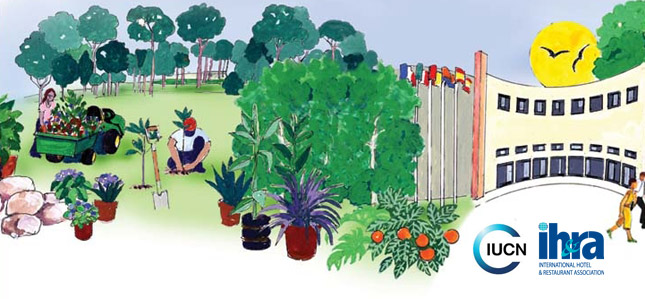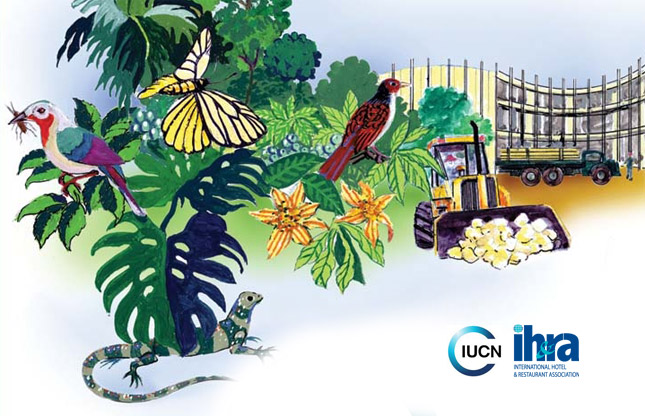Biodiversity

Biodiversity plays an important role in the day-to-day life of a hotel: from the food in the restaurant and wood in furniture and fittings, to the amenities in the spa, the products of biodiversity are everywhere inside hotels. Outside, plants and animals make a hotel's public areas and gardens attractive for guests, while beyond the hotel gate, national parks, green spaces, coasts and natural habitats provide guests with opportunities for recreation and enjoyment.
Biodiversity is the foundation of life on Earth. It underpins the functioning of ecosystems from which we derive essential products and services (known as ecosystem goods and services) such as oxygen, food, fresh water and medicines. Healthy biodiversity is essential to human wellbeing, sustainable development, and poverty reduction. But people, particularly in the developed world, have become so far removed from nature that we have forgotten how much we rely on it.
Combining the Greek word for life, bios, with diversity, the term biodiversity refers simply to the vast variety of life on Earth. This diversity is expressed in many ways, from the number of species of living organisms, to the variations between individuals of those species, to the variety of ways in which these species group together to form different habitats and ecosystems. An ecosystem is the combination of living organisms and the physical environment in which they live. Each main type of ecosystem - from forests, mountains, deserts and grasslands, to freshwater, coastal and marine ecosystems - can be subdivided into more specific ecosystem categories according to their physical features and the types of organisms that inhabit them.
What are the business benefits of adopting responsible biodiversity practices in your hotel? How do hotels impact on biodiversity? How can hoteliers take action? The IH&RA and IUCN Guide "Biodiversity: My hotel in action!" What does biodiversity do for us? What are the threats to biodiversity?
December 1949, the Argentinean Government recognized IHA and gave her a status of a nonprofit organization under the name of Associasion Internacional de hosteleria.
Download "Biodiversity: My hotel in action!"
English: http://cmsdata.iucn.org/downloads/iucn_hotel_guide_final.pdf
French: http://cmsdata.iucn.org/downloads/iucn_hotel_fr_final_single_1.pdf
Japanese: http://cmsdata.iucn.org/downloads/biodiversity_my_hotel_in_action_jp.pdf
View the video "Biodiversity: My hotel in action!"
English: http://www.youtube.com/watch?v=YB3LdZKIw08
French: http://www.youtube.com/watch?v=aWP9TTIdNAQ&feature=related
ABOUT THE INTERNATIONAL UNION FOR CONVERSATION OF NATURE
WHAT ARE THE BUSINESS OF ADOPTING RESPONSIBLE BIODIVERSITY PRACTICES IN YOUR HOTEL?
Implementing good environmental practices in hotel operations, including using biological resources more sustainably, can result in positive business benefits as well as make an important contribution to biodiversity conservation. Key business benefits include:
Appealing to engaged consumers: Tourists are increasingly motivated by sustainability and contributions to biodiversity conservation, as well as healthier environments and products.
Reducing costs: Good biodiversity practices can actually lower a hotel's operating costs, by reducing expenses for resource procurement, usage and disposal.
Improving the quality of the destination: Destinations rich in biodiversity are attractive places, appeal to quality customers, and offer scope for biodiversity-based recreational activities.
Improving employee productivity and sense of responsibility to the environment: Employees are often strongly motivated by actions to enhance biodiversity; such motivation helps to increase employee productivity and loyalty, and can reduce staff turnover.
Securing a hotel's 'license to operate' : Implementing good practices for biodiversity demonstrates that a hotel cares about the environment and runs a responsible business, and can lead to increased support from government, staff and local communities.
Attracting investment from socially responsible investors: Investors want to be sure that their funds are invested in businesses that have good environmental records.
HOW DO HOTELS IMPACT ON BIODIVERSITY
Each individual has a different impact on the environment. The level of this impact will depend on personal choices and may well be scattered around the globe: food may be imported from other continents, water piped from rivers and reservoirs some distance away, and waste may be disposed miles away from its source. The same is true for a hotel.
A hotel impacts biodiversity at each stage of its life cycle, from planning through to closure:
At the planning stage, the most important issue in determining the level of impact that a hotel will have relates to choices about its siting and design. Even the most sustainably operated hotel will have major impacts if it is built in a biodiversity-sensitive area. Choices about the materials that will be used to construct the hotel, where those materials will come from and the total physical footprint of the hotel will also influence how significant its impacts will be in the operational stage.
At the construction stage,impact is determined by the size and location of the area cleared for development and where construction activities are taking place, the choice of construction methods, the sources and amount and type of materials, water and energy used to build the hotel, the location of temporary camps for construction workers, inadequate storage facilities for construction materials, the amount of construction waste that has to be disposed of, and other types of damage such as surface soil erosion or compaction caused by construction activities or disruption of natural water flows and drainage patterns.
In the operational stage,a hotel's impact comes mainly from the energy, water, food and other resources that are consumed in running the hotel, by the solid and liquid wastes it produces, by the way its grounds are managed, and by the direct impacts of its guests. In addition, regular renovation and replacement of furniture, appliances and facilities can cause impacts through purchasing choices and increased waste generation. Using energy and water more efficiently, using organic and sustainably produced food, reducing, treating and disposing of waste appropriately, making sustainable purchasing decisions and managing gardens with natural-style plantings can all help a hotel to reduce its adverse impacts on biodiversity. Similarly, a hotel's relationship with host communities not only affects the sustainable operations of the hotel but also the use of environmental resources by communities themselves.
At the closure stage,a hotel's impacts come from the disposal of materials removed from the hotel to refurbish it, convert it for other uses, or demolish it, and from the work involved in these activities. It may be possible to reuse and recycle some materials, but there may also be some toxic materials, particularly from older buildings, which will require careful handling and management. A responsible hotel operator should also foresee supporting activities of ecological restoration as required.
HOW CAN HOTELS TAKE ACTION THE IH&RA AND IUSN GUIDE "BIODIVERSITY: MY HOTEL IN ACTION!"
Despite this range of threats, there are solutions. The causes of biodiversity loss need to be addressed by society as a whole, and we each have a part to play in meeting this challenge. While much has been done to protect the environment and biodiversity in the last decades, there is still very much to do. The key is to keep our uses of biodiversity and ecosystem services within sustainable limits.
Recognizing the many opportunities for action, IH&RA has joined forces with the International Union for Conservation of Nature (IUCN) and Accor to develop the guide "Biodiversity: My Hotel in Action! A Guide to Sustainable Use of Natural Resources".
The guide is structured around the main operational areas of a hotel: restaurants, public areas, including the spa, guest rooms, hotel souvenir shops, hotel grounds and gardens. It also covers the relationships a hotel can establish with the surrounding community. For each of these areas, the guide provides management tips focusing on what can be done internally, with the suppliers, with the clients and with the community. The management tips are then complemented with technical fact sheets developed by TRAFFIC, the wildlife trade monitoring network, listing conservation issues and advice on which species to choose and which to avoid.
Download "Biodiversity: My hotel in action!"
English: http://cmsdata.iucn.org/downloads/iucn_hotel_guide_final.pdf
French: http://cmsdata.iucn.org/downloads/iucn_hotel_fr_final_single_1.pdf
Japanese: http://cmsdata.iucn.org/downloads/biodiversity_my_hotel_in_action_jp.pdf
View the video "Biodiversity: My hotel in action!"
English: http://www.youtube.com/watch?v=YB3LdZKIw08
French: http://www.youtube.com/watch?v=aWP9TTIdNAQ&feature=related




